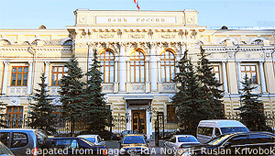Putin’s Maverick Adviser Defies Nabiullina With $64 Billion Plan

(Bloomberg – bloomberg.com – Anna Andrianova – October 30, 2016)
Sergei Glazyev agrees with President Vladimir Putin that shock therapy would be ill-advised for Russia. Which is also where he parts ways with his boss.
Ever since the central bank’s shift to a free-floating exchange rate in late 2014, the country has been under the onslaught of policies that have “elements of shock therapy in the guise of inflation targeting,” said the president’s economic adviser and a former candidate to lead the Bank of Russia.
Interest rates he calls “prohibitively high” have put the recession-hit economy on a starvation diet, he said in an interview before the central bank on Friday left its benchmark interest rate at 10 percent. And instead of deflecting the shocks, Russia has been dealt “colossal damage” by a flexible currency, which Glazyev says ushered in instability and upended investment plans by companies.
Russia’s most vocal cheerleader for stimulus is straining to be heard over the policy consensus that pits him against both Putin and the current central bank governor, Elvira Nabiullina. As a blueprint for a way out of an economic dead end, Glazyev looks to the period of post-war reconstruction in Germany and Japan. Should Russia act to increase refinancing available for businesses to as much as 4 trillion rubles ($64 billion) from about 200 billion rubles, economic growth of 8 percent would be within reach, he said.
“My proposals will be sought after, otherwise the consequences of economic policy that’s being conducted are already resulting in a catastrophe for what’s left of manufacturing and construction after the shock therapy,” Glazyev said.
‘Constant Earthquake’
The decision to allow the ruble to trade freely is a point of particular contention for Glazyev. While the central bank has credited a more flexible exchange rate with helping the economy withstand the worst oil crash in a generation, Glazyev says its effect was similar to a “constant earthquake” rattling a large city. What he urges is not a fixed but a stable ruble, pointing to the example of countries including China that used their currencies to touch off a boom in investment and economic growth.
“Why cause this earthquake artificially if Russia’s foreign-exchange and financial system has an excess margin of safety, easily allowing to maintain a stable ruble,” Glazyev said. “The exchange rate needs to be sufficiently stable to make it possible for businesses to plan long-term investment.”
Yeltsin, Sanctions
Glazyev’s career arc is unusual even by the standards of post-Soviet Russia. Over more than two decades, it’s taken him from a ministerial post in the late President Boris Yeltsin’s government in 1992-1993 to a list of people subject to U.S. and European Union sanctions for their role in the Ukrainian conflict.
Once a leader of the nationalist Rodina party, he was named Putin’s adviser in 2012, with a focus on ties within Russia’s economic bloc with other ex-Soviet states. Now also a member of the president’s economic council, he’s preparing an “alternative” program to the plan being designed by former Finance Minister Alexei Kudrin, who’s also on the advisory body.
Kudrin’s proposals center on steps to cut the budget deficit, rein in inflation and carry out reforms to spark growth of 4 percent in 2018 and 2019. Glazyev’s view hinges on defending the ruble, using a more stable exchange rate and unlocking domestic sources of investment to modernize the economy.
Gross domestic product is on track for a second year of contraction, the longest recession under Putin. While economic expansion averaged 7 percent during his first two terms as president in 2000-2008, the International Monetary Fund now puts medium-term growth at 1.5 percent a year. Nabiullina has called for a “responsible” macroeconomic policy and “structural reforms,” saying that even oil at $100 a barrel wouldn’t lift medium-term gains in GDP beyond a range of 1.5 percent to 2 percent.
Banks, Speculators
Glazyev estimates Russia is suffering from a funding deficit of at least 5 trillion rubles, an amount he says needs to be pumped into the economy through instruments of refinancing. It’s not so costly when you consider the alternative of growing social tension as a result of people being unable to fulfill their potential, he says. Inflation will still be in check because of factors including a wider choice of goods and improved competitiveness of Russian products, according to Glazyev.
While the views of his opponents may be on the ascendant, Glazyev’s has an explanation for why a policy of elevated interest rates is for now carrying the day: it serves the interests of banks and “financial speculators,” he said.
“This group of people may be small, but it’s very influential, because they formulate policy,” he said. “The financial market is in their hands and they are convincing the country’s leadership that everything is fine and nothing needs to change.”
Article ©2016 Bloomberg L.P. All Rights Reserved. Article also appeared at bloomberg.com/news/articles/2016-10-30/putin-s-maverick-adviser-defies-nabiullina-with-64-billion-plan
